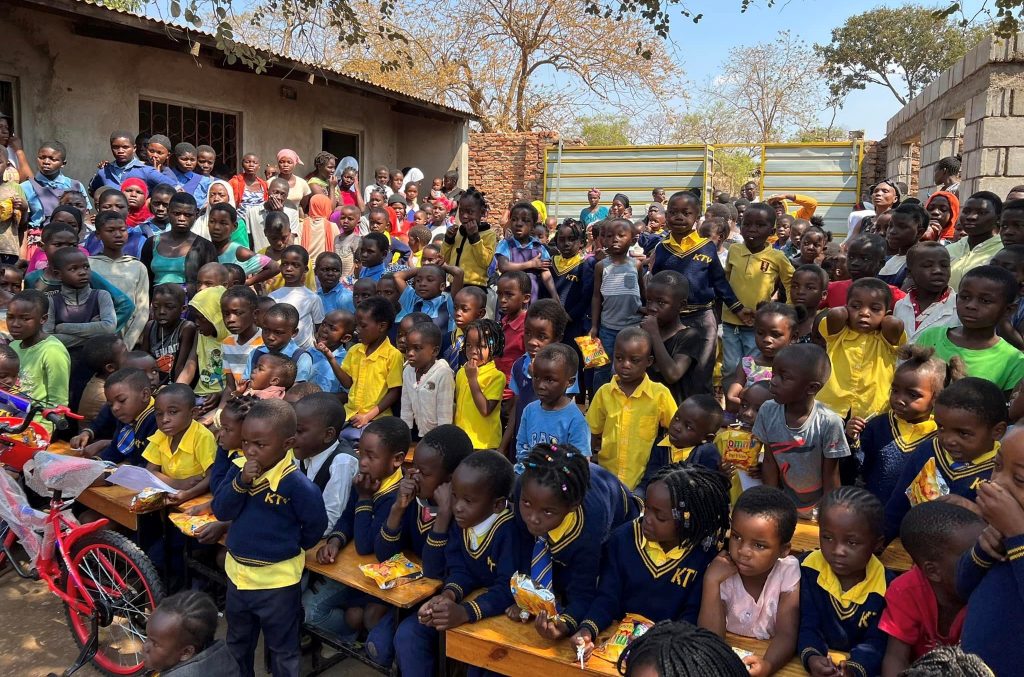Natasha Khulunga:Co-founder of Ketava Private School
After the tragic death of her mother, Natasha Njobvu Khulunga faced difficulties as she assumed the role of breadwinner for her family at just 16 years.
It was not an easy task, but she had to grow up to take care of herself and her siblings for them to have a better life.

For a young girl who aspired to be a great woman, she faced many challenges in pursuing her education.
It is for this reason that Natasha values education and inspires her society to promote education to young ones.
Her goal is to improve access to education for everyone, empower individuals, break the cycle of poverty and foster community development.
“I have grown up around friends who became relatives. They have helped me in my success—establishing my school and organisation,” she said.
As an orphan, she was determined to conquer her fears.
Natasha is now a role model to many young people and making tremendous impact through her school.
She is co-founded Ketava Private School, comprising a kindergarten and junior primary school in Chilinde.

The school’s primary focus is on serving families from lower and middle-class backgrounds who are unable to afford high tuition fees.
It was founded in 2016 while Natasha was still in college by converting a house into a classroom. It only had baby and nursery classes then.
At that time, she employed three staff members. In 2020, the school became fully registered and started offering reception and junior primary classes.
“I was inspired to establish a school in the urban slum where I grew up. I noticed that many young people in my area exhibit negative behaviour and I wanted to provide them with access to education.
“In 2010, after losing my mother, I became the breadwinner for my family. Fortunately, I received support from a woman with a golden heart, Dorth Tate, who helped me pursue my education,” she said.
That experience motivated the good hearted young Natasha to help others in her community access education as well.
Through her research, she discovered that most children in her area do not attend school until they reach Standard One in government schools.
Natasha observed that other lower class families cannot afford to send their children to school because of poverty.
Ketava School currently has 130 students— eight of which are orphans who receive free tuition— and nine staff members.
“My goal is to establish three schools in other urban slums similar to Mchesi such as Chiuzila, Mtandile, Area 50 and Area 36, within the next five years.
“These areas are densely populated with lower and middle-class families. I aim to provide high-quality education to more children and expand access to education for those who may not have had the opportunity otherwise,” narrated Natasha.
She added that ideally, she would like to see a community where education is accessible to all individuals, regardless of socioeconomic background.
Said Natasha: “I envision a community where quality education is affordable and readily available, enabling everyone to reach their full potential and contribute positively to society.
“I hope for a community where educational opportunities are equitable, ensuring that no one is left behind or limited by financial constraints. I would like to see a community that values education as a cornerstone for development, where it is seen as a fundamental right and a powerful tool for social progress.”
Her wish is to see every young girl attain education no matter what they face in life.
“Growing up with a single parent was not been easy for me after my father passed away. My mother did not go far with education and could not find a decent job.
“As a result, she tried different businesses to earn a living and joined different women’s groups to support each other economically,” she said.
In 2002, her mother opened a school with the same name, but the aim was to earn a living.
However, the school was not registered and was closed in 2004 since it did not meet the educational standards of a private school.
During the time her late mother was operating the school, she learned a lot from her.
“I learned that with determination, anything is possible and no need to be fully qualified to achieve success.
“In 2006, things worsened when my mother fell ill and was hospitalised for two months. When she got better, she tried a few businesses, but in 2009, I transferred to a community day secondary, a night school when my mother could not pay for our school fees anymore.
“This was not an easy transformation and I witnessed my younger sister start her Form One at a community day secondary school, something I was never used to,’’ she narrated.
In February 2010, her mother passed away and this was when she realised that her mother was trying her best to raise her well.
None of her relatives were willing to take them in and that’s when she became the breadwinner of her family.
She sold mandazi, freezes and water for survival until she wrote the Malawi School Certificate of Education (MSCE) examinations.
“In October of the same year, I received a call from Opportunity Bank that some gentlemen wanted to see me. At first, I was afraid, thinking that my mother had taken a loan and never paid it back.
“But after meeting him, they told me that a good friend of my mother from abroad was offering to pay for her and sibling school fees after she learnt about her demise.
It was a turning point for Natasha. She re-wrote her MSCE at Matindi Girls Academy and got 16 points and was selected to Lilongwe University of Agriculture and Natural Resources (Luanar).
After graduating from college, she thought of giving back to society and contributing to the future of others.
She introduced Young Stars, an initiative aimed at paying school fees for hard-working students.
The initiative started with community day secondary schools and later reached technical schools.
Despite limited financial resources, Natasha paid school fees for seven community day secondary and technical college students.
One of these students is pursuing a bachelor’s degree in accounting at DMI University and she is also an employee of Ketava School.
When asked about sponsors, she said they don’t have any.
Her role model is Tate: “The selfless woman who has supported many girls around Africa to pursue a good education.”
One thing she has learned in life is to thrive.
Growing up without parents and support from relatives was challenging, but it made her resilient and determined.
Natasha learned to rely on herself, believing in her abilities and take charge of her life.
Setbacks have taught her the value of resilience and she developed empathy for others.
Despite the difficulties, she is proud of what she has become and is excited to pursue her dreams to make a difference.
She said:”Our experiences can be a source of strength and inspiration, no matter how difficult. They teach us important life lessons and mould us into individuals capable of overcoming obstacles.
“My advice to young women is to believe in themselves and their abilities. Despite life’s challenges, you can achieve anything you set your mind to. Surround yourself with supportive and empowering individuals who believe in your potential,” she beamed.
She said balancing her career with family is about managing time, communicating openly and making tough choices.
“The hardest decision I had to make was turning down a job that required too much travel and time away from my family,” she said.
Natasha added that family is important and maintaining a healthy work-life balance is crucial for happiness and well-being.
It’s an ongoing process of finding what works for me and being present in each role,” beamed Natasha.
Born on May 14 1995, she is the second born in a family of three.
She is married to Robert Khulunga and was raised in Mchesi.
Natasha comes from Chaseta Village, Traditional Authority Chiseka in Lilongwe.
During her leisure time, she loves to watch movies, especially animation.
She has a bachelor’s of science degree in Agronomy obtained from Luanar in 2018.
She is currently pursuing a master’s degree in business administration and management at UNICAF University.
Natasha is project administrator for the Freedom from Fistula Foundation.
The foundation addresses obstetric fistula, a devastating childbirth injury affecting women in Malawi.
And her role as a project administrator is to provide direction and leadership to ensure that projects are completed on time, within budget and to the satisfaction of stakeholders involved.






One Comment